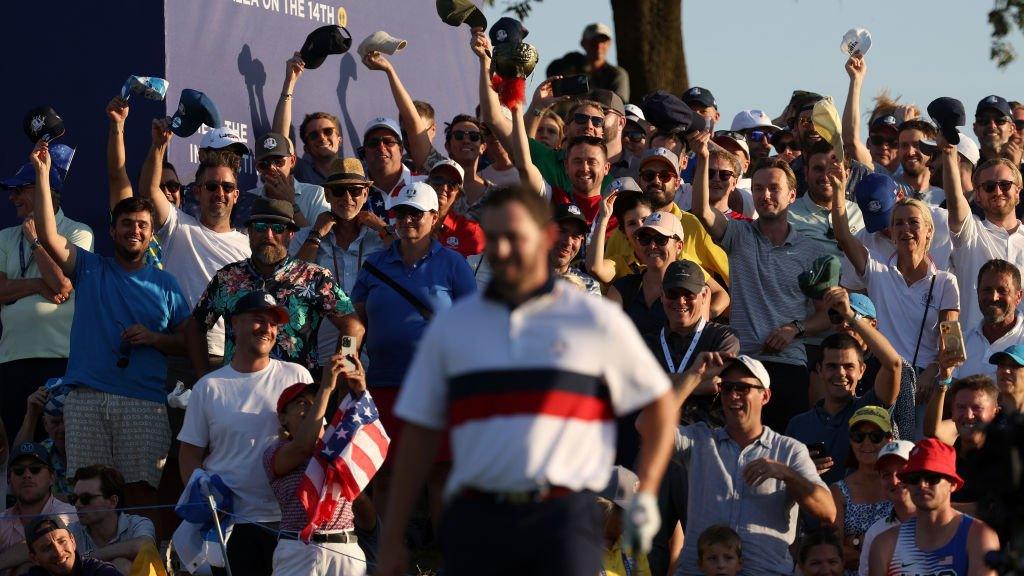Ryder Cup: Patrick Cantlay's 'hat-gate' prompts questions around pay at event
- Published
- comments

Thousands of European fans waved their caps at Patrick Cantlay during the Ryder Cup as 'hat-gate' took hold
Ever wondered why the likes of Mark O'Meara and David Duval have never captained the US Ryder Cup side?
Both would have the right credentials, O'Meara is a two-time major champion, Duval was the Open winner in 2001 and a dominant world number one. Both are articulate, intelligent former team members and potentially fine leaders.
Neither has had a look in, though. It is surely no coincidence that in 1999 - along with Tiger Woods - they suggested golfers should be paid to play in the Ryder Cup.
This thorny issue has resurfaced and is rumbling with renewed vigour, courtesy of 'hat-gate'; Patrick Cantlay's apparent refusal to wear a team cap playing for the US at the Ryder Cup in Italy last month.
It was initially reported by Sky Sports' Jamie Weir as being a protest by Cantlay against the fact that Ryder Cup players are not remunerated.
It is worth noting that, as a result of the 1999 protests, US team members receive $200,000 (£164,000) to donate to charities of their choice. And 20% of the Ryder Cup's media rights go to the PGA Tour and into its pension fund - to the benefit of their players.
But, there is no fee for turning out for your country or continent, depending on which side of the Atlantic you are representing.
Responding to the allegations made by Weir, which included a resulting fracture in the US team room, Cantlay stated at Marco Simone that they were "the furthest thing from the truth".
But that stance has now been called into question by one of American golf's most experienced writers.
Michael Bamberger, of the Fire Pit Collective, claims that numerous sources allege that, when asked why he was not wearing a cap on the first tee on the opening day, Cantlay said: "I'll wear a hat when I'm paid to be here like he is."
Cantlay is said to have looked towards the PGA of America's senior media executive Julius Mason, who was standing nearby.
The 31-year-old player, who has career earnings in excess of $60m, could hardly have anticipated how the next few days would play out as Europe won back the trophy by beating his US team 16½-11½.
After all, Cantlay is by no means the first player to go hatless at a Ryder Cup. The imperative to wear headgear of usual sponsors is absent and several stars on both sides have historically taken advantage to improve facial tan lines.
So was this a protest or wasn't it? If you are making a statement, is it not better to be explicit? Or is it wiser to remain coy, especially on an issue as contentious as this?
The notion of these golfers wanting to be paid is an anathema to so many fans who revel in the "purity" of the Ryder Cup.
As Europe's captain Luke Donald put it: "The Ryder Cup represents true sport. It's the purest form of competition we have, and I think because of that, the fans love it. It's purely, purely sport. That's what makes it so special."
This feels especially poignant at a time when golf's agenda is so dominated by monetary concerns. It's a time when $20m tournaments are becoming the norm and Ryder Cup standard players enjoy fantastic levels of wealth.
The future of the game is wrapped in negotiations worth billions of dollars. The PGA Tour and DP World Tour are trying to turn a framework agreement with Saudi Arabia's Public Investment Fund into a lucrative future-proofing deal by the end of the year.
The breakaway LIV tour continues to shower winners of their 48-man tournaments with $4m at each of their stops. The players who signed up and received eye-watering joining fees have, in many quarters, been labelled greedy mercenaries.
They, though, would argue, as independent contractors, they are simply making the best living they can - just as we all do. And the main tours have no issue with the source of the money, despite Saudi Arabia's much criticised human rights record.
None of that matters. All that counts is money. And counting it all at the top of men's professional golf would take a very, very long time. It is awash with the stuff and seems to be almost the only thing anyone in the sport cares about.
So, yes, for one week every couple of years it is refreshing to see these star players competing for nothing more than sporting glory. It elevates the Ryder Cup to one of the greatest sporting occasions.
And, in turn, the Ryder Cup then becomes a vast cash cow - one that bankrolls Europe's DP World Tour and the PGA of America, the body that represents the club pros of the United States.
We arrived early on the Sunday morning at Marco Simone because my BBC producer wanted to buy a souvenir from the huge shop that greeted every spectator on arrival. The queue was so long we abandoned the plan.
As thousands of credit cards tapped on terminals in the shop, hundreds of millions of dollars flowed from broadcast rights and ticket holders grabbed grandstand seats that had cost more than a pretty penny.
We were among the thousands of people paid to be there; fulfilling roles that help make our living.
But the players, many of who might pick up sponsorship bonuses for qualifying to play in the event, receive no payslip from the DP World Tour or PGA of America.
Does that seem right? The teams contesting the rugby and cricket world cups right now are all being paid and we don't seem to mind. It is professional sport.
Why should the Ryder Cup be different? It seems a reasonable argument.
But if a multi-millionaire player poses this question - either implicitly like Cantlay seems to have done or explicitly in the way that O'Meara and Duval did all those years ago - they prompt an eternal pile-on.
No one will forget the hat-waving barracking that Cantlay received in Italy, while O'Meara and Duval's stance is so vividly remembered they have not come close to to leading their country in these biennial transatlantic jousts.
"I don't have to get paid to come here and perform in front of people, to be honest," said Masters champion and European talisman Jon Rahm in Italy.
Some things are sacred.
To the fans and the vast, vast majority of golfers lucky enough to have played in it - the Ryder Cup is one of those entities.
Why? Well, they would argue that it is different. Gloriously different.
